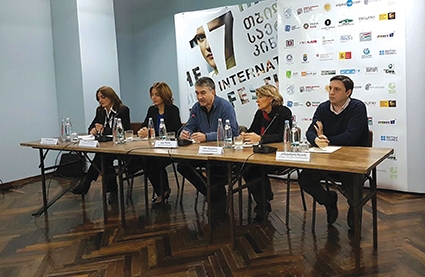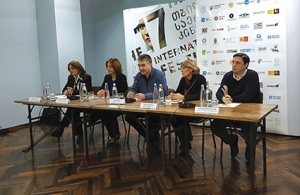A Good Week for Film-lovers & Film-makers
We’re looking ahead to what is definitely the best week of the year for film-lovers in Tbilisi when on Monday evening the Tbilisi International Film Festival opens with the screening of the German-Czechoslovak film ‘Rosa Luxemburg.’
The 17th edition of the festival is to last seven days and is set to screen a total of 129 movies in the Amirani and Rustaveli cinemas.
The heart of the festival is the international competition of debut features. Ten European films will compete for the prize of Best Film and Best Director.
Many of the movies are from former communist countries like Serbia, Romania and Poland, and tell the story of people struggling with the difficulties within their daily lives.
‘A Good Wife,’ for example, tells the story of a middle-aged wife and mother in Belgrade whose life turns upside down when she finds a videotape incriminating her husband for war crimes and ‘Anna's Life’ is about a single mother in Georgia who wants a better life for her autistic son and herself but becomes the victim of a crook. The last is one of the two Georgian contributions to the competition.
Selection of International Arthouse Films
Yet the festival is more than a competition. “We want to bring a selection of international arthouse movies to Tbilisi once a year,” says director, Nino Anjaparidze, because “the cinemas here only show popcorn movies,” she adds, referring to the common blockbusters.
Accordingly, the sections of the festival showing international arthouse movies are particularly popular with the audience.
The section ‘Horizons’ shows independent movies from South America, Asia and the Middle East. The ‘Forum of European Cinema’ consists of 20 recent films from throughout Europe, among them ‘I, Daniel Blake’ from Ken Loach, ‘Finding Altamira’ from Hugh Hudson and ‘Safari’ from Ulrich Seidl, who is well-known for bringing up disputable topics.
There will also be a section with new films from Germany and France.
Expanding the Focus on Emerging Filmmakers
“One main goal of the Film Festival is to promote and support young filmmakers,” says Anjaparidze. “That's why we not only screen films by young directors but also work with them and help them to realize their projects.”
To this aim, the festival introduced the ‘Industry Days’ program three years ago.
Film-makers can apply in advance to attend workshops in which they get the opportunity to improve their projects. The workshops in scripting and casting are closed but in the two pitching workshops for short films and for full-length feature films, the participants have to present their projects openly for a new film after working on them for two days. The best project will be selected publicly and awarded with 3000 and 5000 GEL respectively (short film: December 3, 2.30pm; feature film: December 2, 11am- both in Rooms Hotel).
Besides the workshops there are masterclasses, one this year with German director Margerethe von Trotta (11/29, 5.30pm, Cinema Amirani), and panel discussions. The future of municipal cinemas in post-communist times will be discussed on December 2 at 2pm in Rooms Hotel. More focused on directors and producers but also open to the public are presentations about particular topics, for example 'Building a festival strategy for your film' (12/3, 12pm, Rooms Hotel).
The Industry Days have extended in past years. In this way the Tbilisi Film Festival makes it not only possible for Georgian film-lovers to see movies from all over the world, but also supports the realization of Georgian films and helps to get them seen beyond the borders of this small nation.
Find out more on www.tbilisifilmfestival.ge
Lukas Mäder











